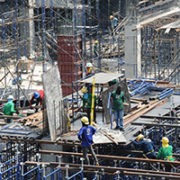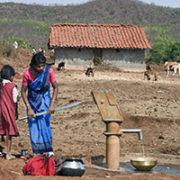Economics
 Economics, Information and Communications Technology
Economics, Information and Communications Technology
 Sanitation, Water
Sanitation, Water
 Agriculture and natural resources, Infrastructure, Regional cooperation and integration
Agriculture and natural resources, Infrastructure, Regional cooperation and integration
 Economics, Industry and trade
Economics, Industry and trade
 Economics
Economics
 Economics
Economics
 Gender, Industry and trade
Gender, Industry and trade
 Education, Population, Sanitation
Education, Population, Sanitation
 Energy
Energy

Sectoral labor income share dynamics: Cross-country evidence from a new dataset

The study of the labor income share plays an important role in understanding the relationship between national income and personal income. However, most of the empirical studies on the labor income share are conducted at the country level, while the limited number of industry-level analyses focus primarily on advanced countries due to limited data availability.
Productive services with the help of internet technologies

One long-standing concern in the economic field has been that services contribute little to economic development. Services would suffer from a so-called Baumol’s cost disease (Baumol 1967), meaning factors such as labor cannot be easily substituted for more productive factors using existing technologies, as it happens in manufacturing. Over time, this would lead services to become a drag on the economy relative to other more productive industries.
No matter how poor you are, there is always a way to improve sanitation

The “out of sight, out of mind” attitude is proving to be critical for the slow progress toward target 6.2 of the Sustainable Development Goals (SDGs), focusing on global, safely managed sanitation. There is a general lack of awareness among users on the whereabouts of their poop, and the discussion on wastewater management is scarce and still a taboo topic in many parts of the world, leading to a lack of safely managed sanitation services. Besides the lack of demand hampering progress, the supply side of wastewater management is equally grim.
Perspectives on Mekong-Japan cooperation for inclusive growth and mutual benefits

Rapid economic development in recent decades has transformed Southeast Asia and prepared the region to join international production networks, which allow greater exports of manufacturing products, textiles, and other primary high-quality valued added products to the international market. This economic development has been achieved thanks to investments from around the globe into the region as a result of a favorable labor force, connectivity and innovation growth, and regional political stability as driven by the Association of Southeast Asian Nations (ASEAN) vision.
Productivity spillovers from services firms in low- and middle-income countries: What is the role of firm characteristics and services liberalization?

It has been widely acknowledged that services play an important role for other industries, in particular manufacturing. A study by the Organisation for Economic Co-operation and Development (OECD) finds that services represent at least 30% of the value added in manufacturing exports (OECD 2014). Another study by the World Bank suggests that countries with a higher services content in their downstream economies are also those producing more complex goods (Saez et al. 2015).
Does skilled emigration matter for real exchange rate volatility?

While more than two-thirds of skilled migrants are directed to the United States, the United Kingdom, Canada, and Australia, they come from more than 100 countries. Skilled emigration opens many indirect general equilibrium questions in the source country. Does skilled emigration matter for volatility in real exchange rates?
Kuznets beyond Kuznets: Structural transformation and income distribution in the era of globalization in Asia

Inequality persists and so does the global concern over it. Kuznets’ views about the inverted-U relationship between inequality and development and the subsequent transformation process have been under the lenses of researchers for a long time. Kuznets’ theory proposed the inverted-U relationship through (i) a declining share of agriculture in total output and (ii) migration from the low-income agricultural sector to the high-income industrial sector (Kuznets 1955).
Is female entrepreneurship a coping strategy during crises?

The recent global economic crisis, with its peak in 2008, resulted in a decline in global gross domestic product. It led to unstable financial markets and a lag in private sector demand (World Bank 2010). Its consequences, especially for the labor market, have been most unfortunate. In many countries, workers lost their jobs, wage earnings declined, and work hours shortened (World Bank 2011).
“Theory of change” as a solution to the global sanitation crisis

The most exciting part of my journey here at the Asian Development Bank Institute is that I get to meet inspiring leaders who have contributed immensely to helping solve the pressing challenges related to sustainable development. This time it was an interaction opportunity with the world-renowned “Mr. Toilet”, i.e., Mr. Jack Sim. If it were not for the efforts of Mr. Toilet and the World Toilet Organization (WTO), the United Nations would not have recognized 19 November as World Toilet Day, an effort by the global agency to mainstream the discussion on wastewater.
Do solar lights help kids do better in school?

Rural areas of Asia and Africa where children lack access to high-quality educational opportunities tend to also be energy poor. Solar lanterns and other small solar energy products, commonly termed “picoPVs”, have been promoted as a promising first step toward improving both lighting in homes and educational outcomes. Rural households throughout Asia and Africa have bought over 100 million picoPVs since 2010, with India, Bangladesh, and other South Asian markets being among the most “vibrant” (and receiving significant market development support from governments and development agencies).


Search
Subscribe / Connect to Asia Pathways
Subjects
- Accelerating Progress in Gender Equality
- Addressing Remaining Poverty and Reducing Inequality
- Agriculture and natural resources
- Capacity development
- Climate change
- Economics
- Education
- Energy
- Environment
- Finance and Innovation
- Finance sector development
- Gender
- Globalization and Economic Stability
- Governance and public sector management
- Health
- Human Capital Development for Inclusive Growth and Shared Prosperity
- Industry and trade
- Information and Communications Technology
- Infrastructure
- Making Cities More Livable
- Miscellaneous
- Population
- Poverty
- Private sector development
- Regional cooperation and integration
- Sanitation
- Social development and protection
- Strengthening Governance and Institutional Capacity
- Subjects
- Transport
- Uncategorized
- Urban development
- Video Blog
- Water
Recent Posts
- The Promise and Perils of Mother Tongue-Based Education
- From Crisis to Resilience: The Evolution of the Banking Sector in Asia and the Pacific
- Tariffs on the Table: What Could Be Asia’s Next Move?
- Investing in Childcare a Win for Women and the Economy
- Flush and Flourish: Upgraded Toilets Can Transform Lives in Rural Asia




Recent Comments